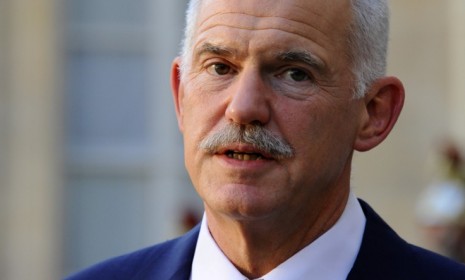Greece's 'rogue' E.U. bailout vote: Democracy or 'tragedy'?
Prime Minister George Papandreou stuns the world with a plan to put the E.U.'s unpopular Greece-saving bailout to a vote — where it's likely to be defeated

A free daily email with the biggest news stories of the day – and the best features from TheWeek.com
You are now subscribed
Your newsletter sign-up was successful
"Greece is not only the cradle of democracy, but of drama," too, says The Economist. Both were certainly in plentiful supply on Tuesday, after Greek Prime Minister George Papandreou shocked Europe, and global markets, by announcing that he will put the fate of last week's massive European bailout package into the hands of Greek voters, through a popular referendum early next year. (Polls show that Greeks overwhelmingly oppose the bailout.) Papandreou's move was so "rogue" that it took his party, and even his finance minister, by surprise. The prime minister argues that Greeks should get to decide between the austerity measures required by the bailout package or a likely default and ejection from the euro currency. Can any good come of this?
At least citizens are being given a choice: Despite all the panic, "this is the best news that the European Union has seen in two years," says Henry Farrell at Crooked Timber. European technocrats have long tried to "integrate by stealth rather than public debate," and Papandreou's referendum marks "the first time that we've actually seen citizens actually being asked about what they actually want" when it comes to Europe's future. It's about time.
The Week
Escape your echo chamber. Get the facts behind the news, plus analysis from multiple perspectives.

Sign up for The Week's Free Newsletters
From our morning news briefing to a weekly Good News Newsletter, get the best of The Week delivered directly to your inbox.
From our morning news briefing to a weekly Good News Newsletter, get the best of The Week delivered directly to your inbox.
This is a sly move by Greece: Look, "the referendum will never be held," and that's the point, says Tyler Cowen at Marginal Revolution. The Papandreou government has just ensured months of "market volatility" with this announcement, and you can bet "the other EU powers will get skittish" and back out. Greece is clearly using the referendum threat to kill the deal "under the guise of 'democracy.'" Why? The bailout package "would make the country totally bankrupt," and Greeks "already feel blackmailed." Papandreou needed an exit strategy, and the referendum is it.
"Why is Greece turning down the 'bailout'"
But now, the EU might just let Greece default: Europe doesn't have to put up with this, says Brett Arends at MarketWatch. Papandreou may have accomplished the impressive feat of "staging a tragedy that is also a farce," but the more prudent EU states can easily "kick these clowns to the curb." Greece's entire debt is $366 billion, and Europe can easily afford to cut those losses. Hell, "more money was 'lost' during yesterday's stock market tumble than in a massive writeoff." It's time for Europe to "eject the Greeks" and let them fend for themselves.
"Greek farce: Let them eat baklava"
A free daily email with the biggest news stories of the day – and the best features from TheWeek.com
The real loser here is Papandreou: The Greeks don't want austerity, but they also don't want to leave the eurozone, says John Cassidy at The New Yorker. And "faced with two unappetizing choices, Greece seems intent on choosing neither." Papandreou is intent on making Greeks, and especially his opportunistic political opponents, own the decision. But what they'll probably choose is to kick him out in favor of a "new 'national unity' government that will give the Greeks what they really want: A European bailout and the right to complain and protest about it."


